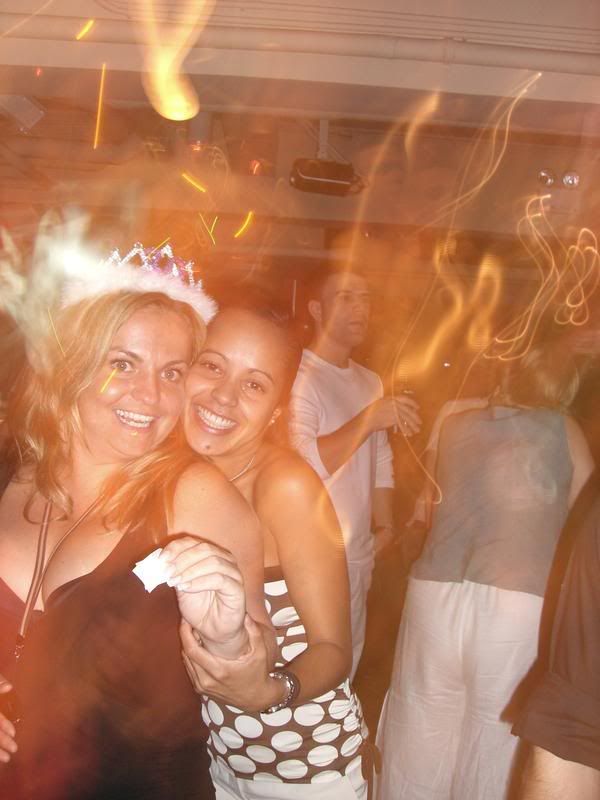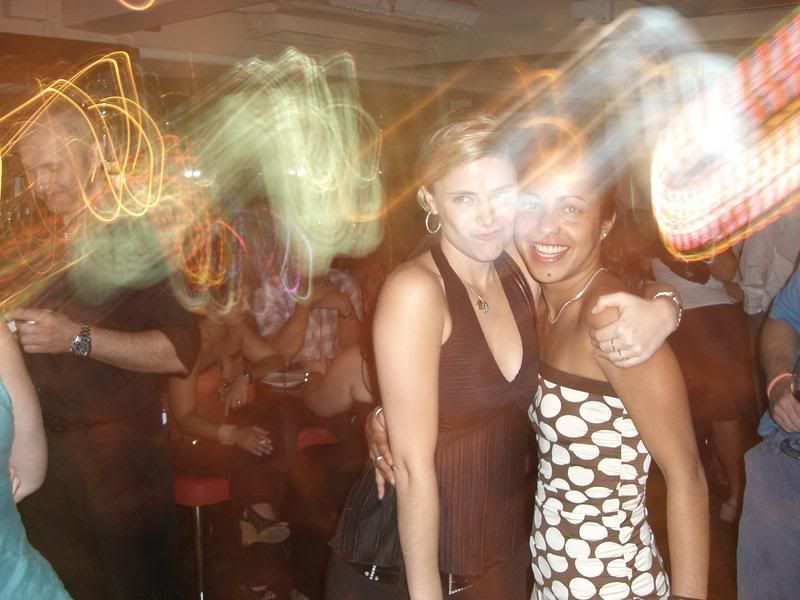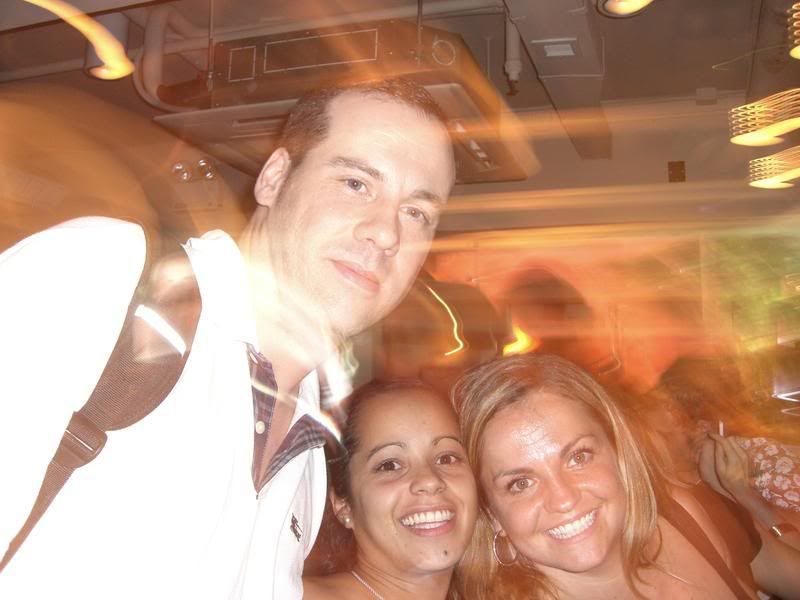Shana Tova
Happy New Year - The Jewish new years eve was on Friday and so Stephen and I spent both Friday and Saturday celebrating the new year. We eat apples dipped in honey to symbolize the wish for a sweet new year ahead. It gives us time to reflect on what happend in the past year and ask forgiveness. . . In any case we had a blast and a great time - I love the Jewish holidays, If for anything - reflecting on what it means to be Jewish and why I am here! The fight for the survival of the Jewish nation and what it means to be an Israeli as well. Its beautiful and am blesed to be here experiencing it all with friends and family. So, for those of you who haven't a clue about 'Rosh Hashanah' here is an excerpt:
Rosh Hashanah in a Nutshell

The festival of Rosh Hashanah --the name means "Head of the Year" --is observed for two days beginning on Tishrei 1, the first day of the Jewish year. It is the anniversary of the creation of Adam and Eve, the first man and woman, and their first actions toward the realization of mankind's role in G-d's world.
Rosh Hashanah thus emphasizes the special relationship between G-d and humanity: our dependence upon G-d as our creator and sustainer, and G-d's dependence upon us as the ones who make His presence known and felt in His world. Each year on Rosh Hashanah, "all inhabitants of the world pass before G-d like a flock of sheep," and it is decreed in the heavenly court, "who shall live, and who shall die... who shall be impoverished, and who shall be enriched; who shall fall and who shall rise." But this is also the day we proclaim G-d King of the Universe. The Kabbalists teach that the continued existence of the universe is dependant upon the renewal of the divine desire for a world when we accept G-d's kingship each year on Rosh Hashanah.
The central observance of Rosh Hashanah is the sounding of the shofar, the ram's horn, which represents the trumpet blast of a people's coronation of their king. The cry of the shofar is also a call to repentance; for Rosh Hashanah is also the anniversary of man's first sin and his repentance thereof, and serves as the first of the "Ten Days of Repentance" which culminate in Yom Kippur, the Day of Atonement. Another significance of the shofar is to recall the Binding of Isaac which also occurred on Rosh Hashanah, in which a ram took Isaac's place as an offering to G-d; we evoke Abraham's readiness to sacrifice his son and plead that the merit of his deed should stand by us as we pray for a year of life, health and prosperity. Altogether, the shofar is sounded 100 times in the course of the Rosh Hashanah service.
Additional Rosh Hashanah observances include: a) Eating a piece of apple dipped in honey to symbolize our desire for a sweet year, and other special foods symbolic of the new year's blessings. b) Blessing one another with the words Leshanah tovah tikateiv veteichateim, "May you be inscribed and sealed for a good year." c) Tashlich, a special prayer said near a body of water (an ocean, river, pond, etc.) in evocation of the verse, "And You shall cast their sins into the depths of the sea." And as with every major Jewish holiday after candlelighting and prayers we recite Kiddush and make a blessing on the Challah.
No single article can capture the paradox of Rosh Hashanah, much less explain it. To understand Rosh Hashanah, we need to exprience it -- spend those hours praying in shul, hear the shofar's hundred notes, dip the apple in honey and eat the tzimmes. But here is a sampling of essays, insights and stories -- some Rosh Hashanah reading to get us in the mood...
I'd like to give credit to the author, www.chabad.org
The content in this page is produced by Chabad.org, and is copyrighted by the author and/or Chabad.org. If you enjoyed this article, we encourage you to distribute it further, provided that you do not revise any part of it, and you include this note, credit the author, and link to www.chabad.org. If you wish to republish this article in a periodical, book, or website, please email permissions@chabad.org
Rosh Hashanah in a Nutshell

The festival of Rosh Hashanah --the name means "Head of the Year" --is observed for two days beginning on Tishrei 1, the first day of the Jewish year. It is the anniversary of the creation of Adam and Eve, the first man and woman, and their first actions toward the realization of mankind's role in G-d's world.
Rosh Hashanah thus emphasizes the special relationship between G-d and humanity: our dependence upon G-d as our creator and sustainer, and G-d's dependence upon us as the ones who make His presence known and felt in His world. Each year on Rosh Hashanah, "all inhabitants of the world pass before G-d like a flock of sheep," and it is decreed in the heavenly court, "who shall live, and who shall die... who shall be impoverished, and who shall be enriched; who shall fall and who shall rise." But this is also the day we proclaim G-d King of the Universe. The Kabbalists teach that the continued existence of the universe is dependant upon the renewal of the divine desire for a world when we accept G-d's kingship each year on Rosh Hashanah.
The central observance of Rosh Hashanah is the sounding of the shofar, the ram's horn, which represents the trumpet blast of a people's coronation of their king. The cry of the shofar is also a call to repentance; for Rosh Hashanah is also the anniversary of man's first sin and his repentance thereof, and serves as the first of the "Ten Days of Repentance" which culminate in Yom Kippur, the Day of Atonement. Another significance of the shofar is to recall the Binding of Isaac which also occurred on Rosh Hashanah, in which a ram took Isaac's place as an offering to G-d; we evoke Abraham's readiness to sacrifice his son and plead that the merit of his deed should stand by us as we pray for a year of life, health and prosperity. Altogether, the shofar is sounded 100 times in the course of the Rosh Hashanah service.
Additional Rosh Hashanah observances include: a) Eating a piece of apple dipped in honey to symbolize our desire for a sweet year, and other special foods symbolic of the new year's blessings. b) Blessing one another with the words Leshanah tovah tikateiv veteichateim, "May you be inscribed and sealed for a good year." c) Tashlich, a special prayer said near a body of water (an ocean, river, pond, etc.) in evocation of the verse, "And You shall cast their sins into the depths of the sea." And as with every major Jewish holiday after candlelighting and prayers we recite Kiddush and make a blessing on the Challah.
No single article can capture the paradox of Rosh Hashanah, much less explain it. To understand Rosh Hashanah, we need to exprience it -- spend those hours praying in shul, hear the shofar's hundred notes, dip the apple in honey and eat the tzimmes. But here is a sampling of essays, insights and stories -- some Rosh Hashanah reading to get us in the mood...
I'd like to give credit to the author, www.chabad.org
The content in this page is produced by Chabad.org, and is copyrighted by the author and/or Chabad.org. If you enjoyed this article, we encourage you to distribute it further, provided that you do not revise any part of it, and you include this note, credit the author, and link to www.chabad.org. If you wish to republish this article in a periodical, book, or website, please email permissions@chabad.org






